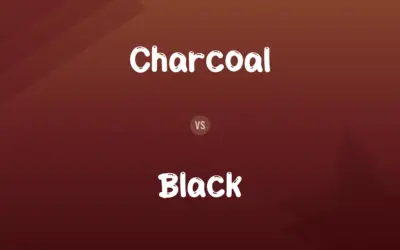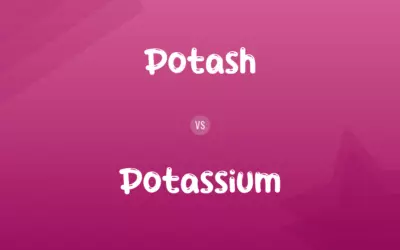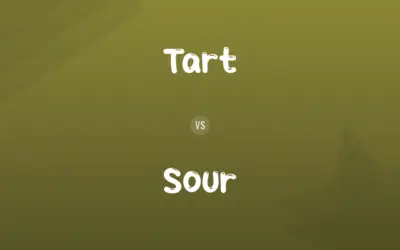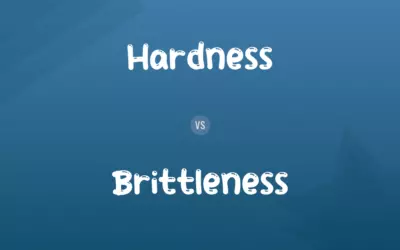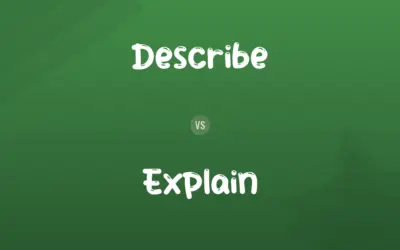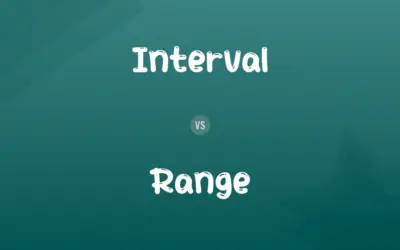Hot War vs. Cold War: Difference and Comparison
By Muazma Batool & Muneeza Rehman — Published on May 22, 2024
A hot war involves actual military conflict between nations, while a cold war is characterized by political tension and competition without direct armed combat.
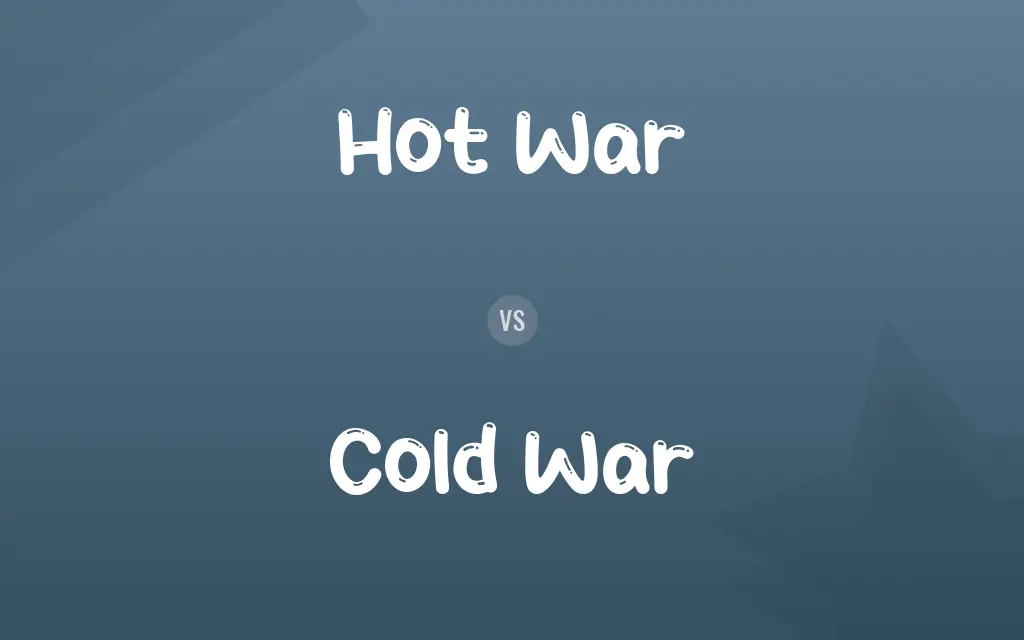
Difference Between Hot War and Cold War
A hot war refers to active, direct military confrontation between nations or groups, involving combat operations and the deployment of armed forces. In contrast, a cold war is marked by indirect conflict, geopolitical tensions, and rivalry, generally without the direct use of military force.
Muazma Batool
May 22, 2024
Hot wars often result in immediate and tangible destruction, casualties, and economic disruption due to the direct nature of military engagement. On the other hand, the cold war focuses on diplomatic, economic, and psychological strategies such as espionage, propaganda, and economic sanctions to influence or destabilize an opponent.
Muazma Batool
May 22, 2024
During a hot war, nations may engage in battles using a variety of weapons and tactics, with clear military objectives and fronts. Whereas in a cold war, the primary tools are political maneuvers, alliances, proxy wars, and the strategic positioning of military resources to exert pressure without actual conflict.
Muazma Batool
May 22, 2024
The outcome of a hot war is typically decided through military victory or defeat, leading to treaties and territorial changes. Meanwhile, a cold war is often resolved through shifts in political power, ideological influence, or changes in leadership, without formal surrender or peace treaties typical of hot wars.
Muazma Batool
May 22, 2024
Hot wars can transition into cold wars and vice versa. For instance, after active hostilities cease, former combatants might enter a phase of cold war, characterized by ongoing rivalry and lack of reconciliation. Conversely, cold wars can escalate into hot wars if diplomatic tensions and conflicts reach a boiling point.
Muazma Batool
May 22, 2024
Hot War vs. Cold War Comparison Chart
Nature of Conflict
Direct military engagement and combat.
Indirect conflict, espionage, and competition.
Muazma Batool
May 22, 2024
Tools Used
Military forces and weapons.
Propaganda, economic sanctions, diplomacy.
Muazma Batool
May 22, 2024
Outcomes
Decided by military victory or defeat.
Influenced by political and ideological shifts.
Muazma Batool
May 22, 2024
Visibility
High visibility due to overt operations.
Often covert operations with less visibility.
Levi
May 22, 2024
Hot War vs. Cold War Definitions
◉Hot War
Combat operations.
The Gulf War saw coalition forces fighting against Iraqi invasion forces.
Muazma Batool
Apr 29, 2024
◉Cold War
Ideological rivalry.
The U.S. and USSR engaged in a global ideological contest during the Cold War.
Muazma Batool
Apr 29, 2024
◉Hot War
Conventional warfare.
World War II was a hot war with extensive military campaigns.
Muazma Batool
Apr 29, 2024
◉Cold War
Proxy wars.
The Vietnam War and Afghan War were part of the larger U.S.-Soviet Cold War conflict.
Muazma Batool
Apr 29, 2024
◉Hot War
Warfront.
The Western Front in World War I was characterized by trench warfare and direct engagements.
Levi
Apr 29, 2024
◉Cold War
Iron Curtain.
The division between Eastern and Western Europe was a symbol of Cold War tensions.
Muazma Batool
Apr 29, 2024
◉Hot War
Battlefield.
The Battle of Gettysburg was a critical confrontation in the American Civil War.
Muazma Batool
Apr 29, 2024
◉Cold War
Space race.
The competition to reach the moon was a high-profile aspect of the Cold War.
Leo
Apr 29, 2024
◉Hot War
Armed conflict.
The Korean War involved direct military action between North and South Korea.
Muazma Batool
Apr 29, 2024
◉Cold War
Nuclear arms race.
The buildup of nuclear weapons was a central feature of the Cold War.
Muazma Batool
Apr 29, 2024
Hot War vs. Cold War Frequently Asked Questions
What defines a hot war?
A hot war is defined by active, direct military conflicts involving combat between opposing forces.
Muazma Batool
May 22, 2024
How do nations prepare for a hot war?
Nations prepare for hot wars by building military capabilities, forming alliances, and strategic planning.
Jonathan
May 22, 2024
How do hot wars and cold wars impact global politics?
Hot wars directly alter political borders and power balances, while cold wars reshape global alliances and influence through indirect means.
Muazma Batool
May 22, 2024
What are the main characteristics of a cold war?
A cold war is characterized by political tension, ideological rivalry, and competition without direct military conflict.
Muazma Batool
May 22, 2024
What ended the Cold War between the US and USSR?
The Cold War ended with the dissolution of the Soviet Union in 1991, following political reforms and economic struggles.
William
May 22, 2024
What role do espionage and intelligence play in a cold war?
Espionage and intelligence are critical in a cold war for gathering information on rival nations and preventing surprise attacks.
Muazma Batool
May 22, 2024
Can a cold war lead to a hot war?
Yes, escalating tensions in a cold war can lead to a hot war if diplomatic solutions fail and conflicts become militarized.
Muazma Batool
May 22, 2024
What are proxy wars in the context of a cold war?
Proxy wars are conflicts where major powers support different sides or factions in other countries' wars, as seen during the Cold War.
Muazma Batool
May 22, 2024
How are civil populations affected by hot wars vs. cold wars?
Civil populations are directly affected by hot wars through casualties and destruction, whereas in cold wars, the impact is more psychological and economic.
William
May 22, 2024
How do international laws apply to hot wars and cold wars?
International laws, like the Geneva Conventions, directly apply to conduct in hot wars, whereas in cold wars, the application is more about diplomatic and economic sanctions.
Elijah
May 22, 2024
Content Creators
Written by
Muazma BatoolAs a content editor, Muazma Batool is not just a grammar guru but a creative mastermind who breathes life into every word. With an eagle eye for detail and a passion for storytelling, she transforms bland text into engaging content that captivates audiences and drives results.
Co-written by
Muneeza RehmanAt Comparisons.wiki, Muneeza skillfully navigates the vast sea of information, ensuring clarity and accuracy as the lead content editor. With a keen eye for detail, she curates every comparison to enlighten and engage readers.





